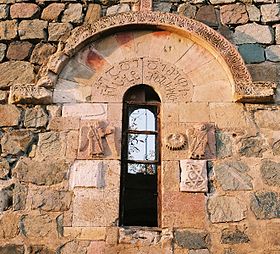| Revision as of 16:28, 1 August 2020 editLawaspirant5580 (talk | contribs)Extended confirmed users2,805 edits fix deprecated image syntax← Previous edit | Revision as of 16:31, 1 August 2020 edit undoLawaspirant5580 (talk | contribs)Extended confirmed users2,805 edits restore prior image sizingNext edit → | ||
| Line 2: | Line 2: | ||
| | name = Doliskana Georgian inscriptions | | name = Doliskana Georgian inscriptions | ||
| | image = 5. dolisyana. bareliefebi. samxretis kedlis sarkmeli.JPG | | image = 5. dolisyana. bareliefebi. samxretis kedlis sarkmeli.JPG | ||
| | |
| image_size = 280px | ||
| | image_caption = | |||
| | material = | |||
| | size = | |||
| | writing = ] inscriptions written in a ] | | writing = ] inscriptions written in a ] | ||
| | created = 10th century | | created = 10th century | ||
| | discovered = | |||
| | location = ] (modern-day ]) | | location = ] (modern-day ]) | ||
| | id = | |||
| }} | }} | ||
| The '''Doliskana inscriptions''' ({{lang-ka|დოლისყანას წარწერები}}) are the ] inscriptions written in the Georgian '']'' script on the ], located in the historical ] Georgian ] (modern-day ] of ]). The inscriptions mention Georgian prince and titular king ].<ref>Eastmond, Antony, Royal Imagery in Medieval Georgia, 1998, pp. 224-226</ref> The inscriptions are dated to the first half of the 10th century.<ref>Shoshiashvili, p. 290</ref> | The '''Doliskana inscriptions''' ({{lang-ka|დოლისყანას წარწერები}}) are the ] inscriptions written in the Georgian '']'' script on the ], located in the historical ] Georgian ] (modern-day ] of ]). The inscriptions mention Georgian prince and titular king ].<ref>Eastmond, Antony, Royal Imagery in Medieval Georgia, 1998, pp. 224-226</ref> The inscriptions are dated to the first half of the 10th century.<ref>Shoshiashvili, p. 290</ref> | ||
Revision as of 16:31, 1 August 2020
| Doliskana Georgian inscriptions | |
|---|---|
 | |
| Writing | Georgian language inscriptions written in a Georgian script |
| Created | 10th century |
| Present location | Tao-Klarjeti (modern-day Turkey) |
The Doliskana inscriptions (Georgian: დოლისყანას წარწერები) are the Georgian language inscriptions written in the Georgian Asomtavruli script on the Doliskana Monastery, located in the historical medieval Georgian Kingdom of Tao-Klarjeti (modern-day Artvin Province of Turkey). The inscriptions mention Georgian prince and titular king Sumbat I of Iberia. The inscriptions are dated to the first half of the 10th century.
Inscriptions
Inscription 1
ႵႤ ႠႣႨႣႤ ႫႤႴჁ ႹႬႨ ႱႡႲ ႫႦႢႰႻႡႧ
- Translation: "Christ, glorify our King Sumbat with longevity."
Inscription 2
ႼჂ ႫႵႪ ႼჂ ႢႡႰႪ
- Translation: "Saint Michael, Saint Gabriel."
Inscription 3
ႸႵႫႬ Ⴑ ჄႪ
ႧႠ ႢႡႰႪ
ႣႩ
ႬႱჂ
ႧႠ
- Translation: "Created by the hand of bishop Gabriel."
Inscription 4
ႼႭ
ႱႲႤ
ႴႠႬ
Ⴄ ႸႤ
Ⴋ
Ⴛ
ႶႰႨ ႢႡႪ
- Translation: "Saint Stephen, have mercy on priest Gabriel."
Inscription 5
ႨႳ ႵႤ
ႼჂ ႤႱႤ ႤႩႪႤႱႨჂ ႼႤ ႣႶႤႱႠ
ႫႤႴႤႧႠ ႹႬႧႠ
ႵႤ ႸႤ
- Translation: "Jesus Christ, have mercy on the church of our kings, o Christ have mercy."
References
- Eastmond, Antony, Royal Imagery in Medieval Georgia, 1998, pp. 224-226
- Shoshiashvili, p. 290
- Marr, p. 185; Shoshiashvili, p. 291; Djobadze, i. 15 ch. 81-83
- Marr, p. 184; Shoshiashvili, pp. 291-292; Djobadze, i. 16-17, ch. 84-85
- Djobadze, i. 18, ch. 85
- Shoshiashvili, pp. 292-293
- Marr, p. 186; Shoshiashvili, pp. 293-294
Bibliography
- Marr, Nicholas, The Diary of travel in Shavsheti and Klarjeti, St. Petersburg, 1911
- Djobadze, Wachtang, Early medieval Georgian monasteries in historical Tao, Klarjeti and Shavsheti, 2007
- Shoshiashvili, N. Lapidary Inscriptions, I, Tbilisi, 1980